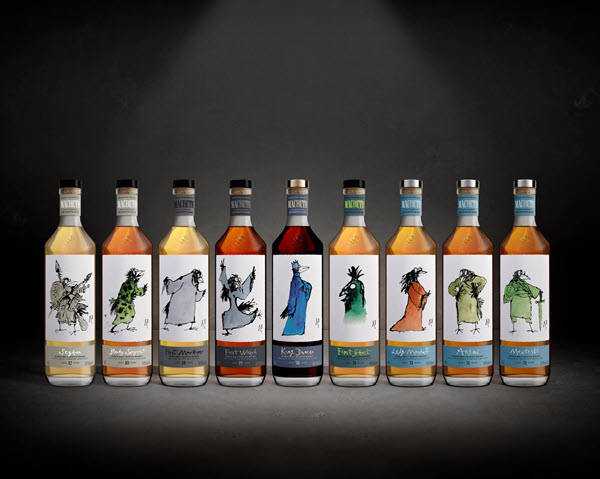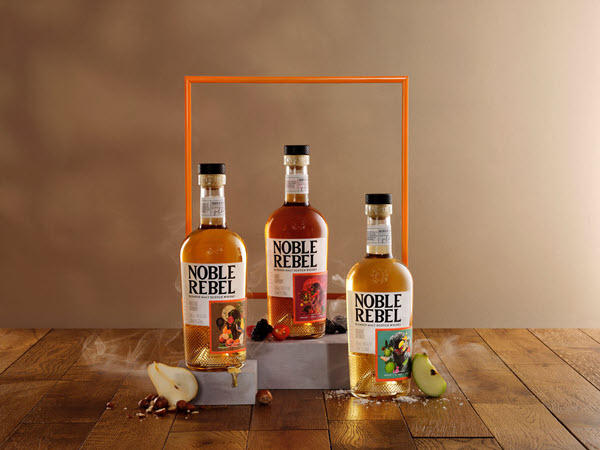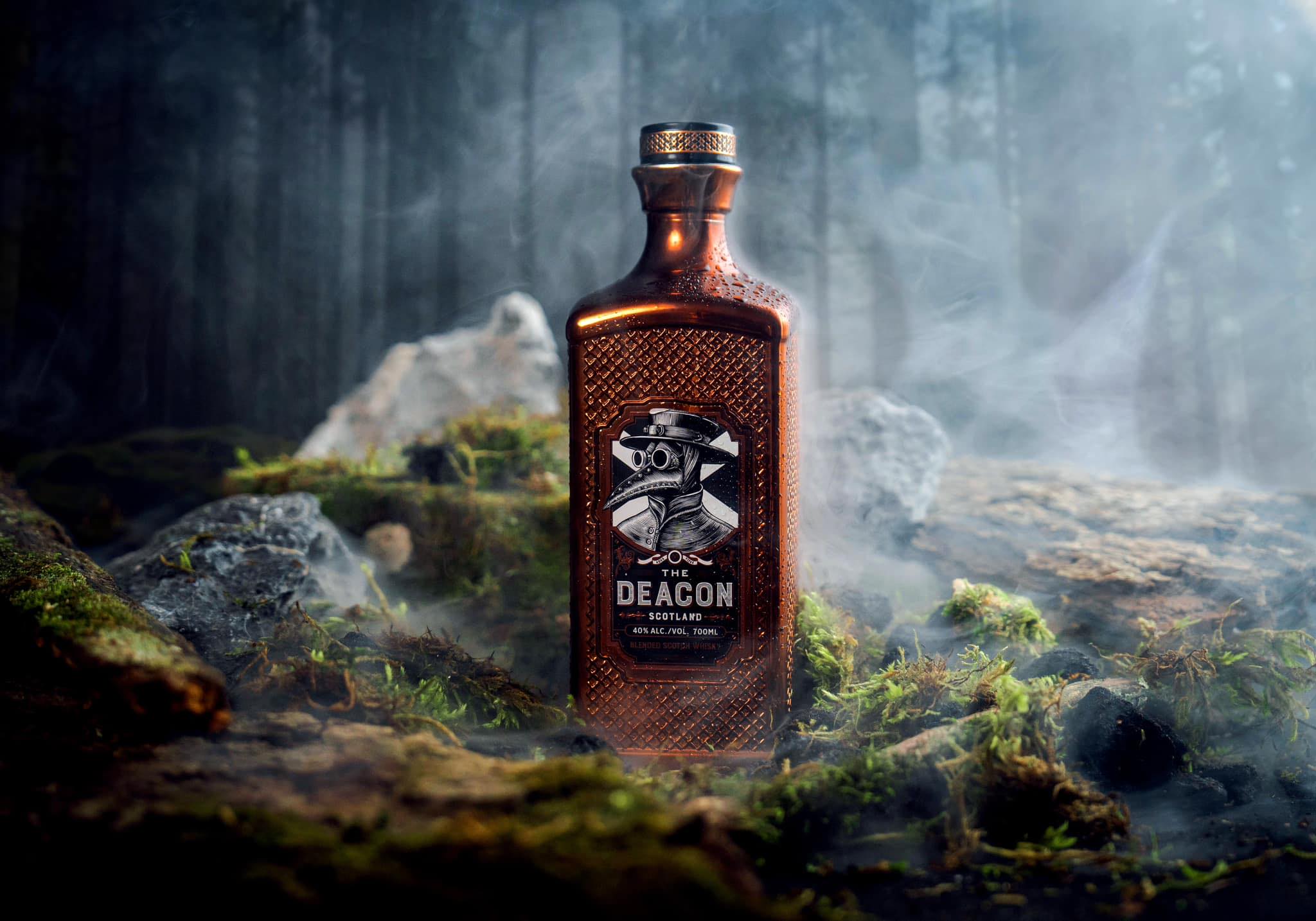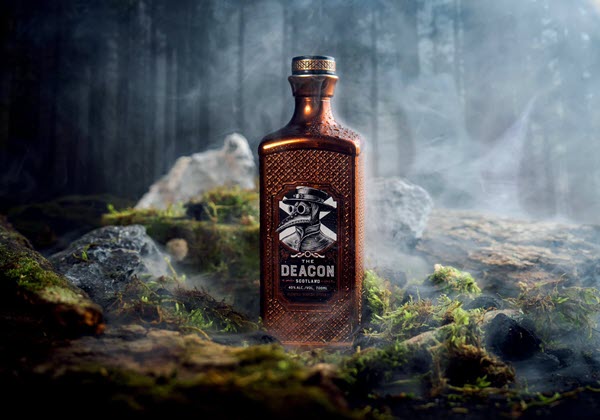Survival of the Fittest: New Wave Scotch
The Scotch whisky market is dominated by established brands with long histories, so introducing something entirely new is beset with difficulties. What are the secrets to success? Richard Woodard investigates for WhiskyInvestDirect…
You can find some pretty bizarre-looking creatures on Scotch whisky labels these days. Take The Deacon, for instance: a new premium blend launched by Sovereign Brands in partnership with Pernod Ricard, with its shiny copper bottle and vaguely nightmarish beaked and goggled 'mascot'.
Then there's The Macbeth Collection – a hugely ambitious series of 42 whiskies, each personifying characters in Shakespeare's play, illustrated in bird form by the unmistakable pen of Sir Quentin Blake. The first 'Act' of nine whiskies was released earlier this year.
The illustrations for Loch Lomond Group's new Noble Rebel trio of blended malts, although vivid, seem almost conservative by comparison: here the brand essence is driven by flavour, the aim to communicate this to the consumer via simple descriptors and images.
Three concepts, three very different approaches, all unified in one respect: they've got a bloody hard job ahead of them. The Scotch whisky marketplace is dominated by historic, established names – in blends, Johnnie Walker, Ballantine's, Chivas; in malts, Glenfiddich, The Glenlivet, Macallan – and the failure rate among new brands is alarmingly high. Will any of these succeed? And, if so, how?

The Macbeth Collection has a fighting chance, if for no other reason than it's a finite set of releases, meaning that when they're gone, they're gone. The concept came from Lexi Burgess and Livingstone, a whisky offshoot from his Burgess Studio design business, which has worked on branding for a number of whisky clients.
Burgess was much taken with whisky's colourful history of family feuds and neighbourly disputes. "I thought: 'Blimey, this kind of self-sabotage is just like Macbeth,'" he says. "I think about whiskies a bit like people anyway. Wouldn't it be interesting to kind of put them all in a room together? But you need a vehicle for that."
Inspiration came via the Hanyu playing cards series of Japanese whiskies – Ichiro Akuto's hugely sought-after 54 releases from the 'ghost' distillery, each representing a different card. "It's the most simple, elegant idea for a collection of whisky that I think has ever been made," says Burgess.
Applying the concept to Macbeth, he enlisted expert help: whisky writer Dave Broom for the words, legendary illustrator Sir Quentin Blake for the labels, Elixir Distillers to source the liquid. Together they found a synergy between rarity and price category on one hand, and character on the other, spearheaded by five 'leads', the first of them King Duncan – a 56-year-old Glen Grant priced at £10,000 a bottle.
Then there are 12 'thanes', including Menteith (a 31-year-old Benriach); six 'ghosts' from – you guessed it – ghost distilleries such as Cambus; four smoky 'witches'; four 'murderers' sourced from Scotland's island distilleries – and 10 whiskies from the 'household', at more affordable price points (around £100).
For Burgess, the key was Macbeth's "rich and sophisticated", and yet highly familiar, narrative. "People generally view themselves as rational, but they're emphatically not," he says. "They're emotional and they're also being driven by desires that they really don't understand. So, if you can find a way to communicate with those desires, you're in a very powerful position."
The Deacon and Noble Rebel are very different beasts: brands that aim at continuity, consistency and longevity, rather than trading on scarcity. But there the similarities end.

Noble Rebel is emphatically driven by flavour, with three variants: Hazelnut Harmony, Smoke Symphony and Orchard Outburst, all created by master blender Michael Henry using malts from Glen Scotia, Loch Lomond and others.
Loch Lomond Group head of innovation Calum Leslie says the target demographic is the "discerning progressive" consumer – people who know their Scotch from their Bourbon, and who are keen to discover new flavours.
"It's incredibly challenging to successfully introduce a new brand into the marketplace as it's a competitive space with many established brands," he adds. "Our challenge is to make sure our unique and interesting story and great-tasting liquids are understood and tried by our target consumers." So far, Noble Rebel has entered seven markets: Poland, Slovakia, Latvia, Taiwan, Japan, Australia and the UK.
Meanwhile, The Deacon is the latest concept from the Sovereign Brands playbook: entering a saturated category with a "disruptive" launch – previous successes including Bumbu rum, Belaire sparkling wine and McQueen & the Violet Fog gin. All stemmed from CEO and founder Brett Berish's "personal desire to be part of a new category", according to Sophie Lawrence, marketing & communications director, Europe, Asia & Africa.

Despite the rather outré packaging, The Deacon is at heart deceptively conventional: a 40% abv blend, priced at £38.99, with a liquid that is sweet, smoky and mixable – in every respect, not dissimilar to the daddy of them all, Johnnie Walker Black Label. But Lawrence isn't fazed by the comparison. "Perhaps the status quo would have been to launch in a different category and achieve cut-through elsewhere," she says. "But we believe that good products don't necessarily have to 'follow the rules' of the most traditional brand in the category."
Combining Sovereign's brand-building prowess and Pernod's distribution might, ambitions are high for The Deacon: launches into 70 international markets in 2023-24, with more to follow, says Lawrence.
Three launches, three contrasting approaches – illustrating the fact that there's more than one way to innovate, even in a category as established and strictly regulated as Scotch whisky. For all of them, success will be measured in longevity as much as anything else: because, in the brutally Darwinian world of Scotch whisky brands, only the strong survive.

Richard Woodard has been writing about spirits and wine for 20 years, editing and contributing to a number of magazines and websites, including Decanter, The Spirits Business, just-drinks.com and Club Oenologique. He was also one of the founding editors of Scotchwhisky.com.




